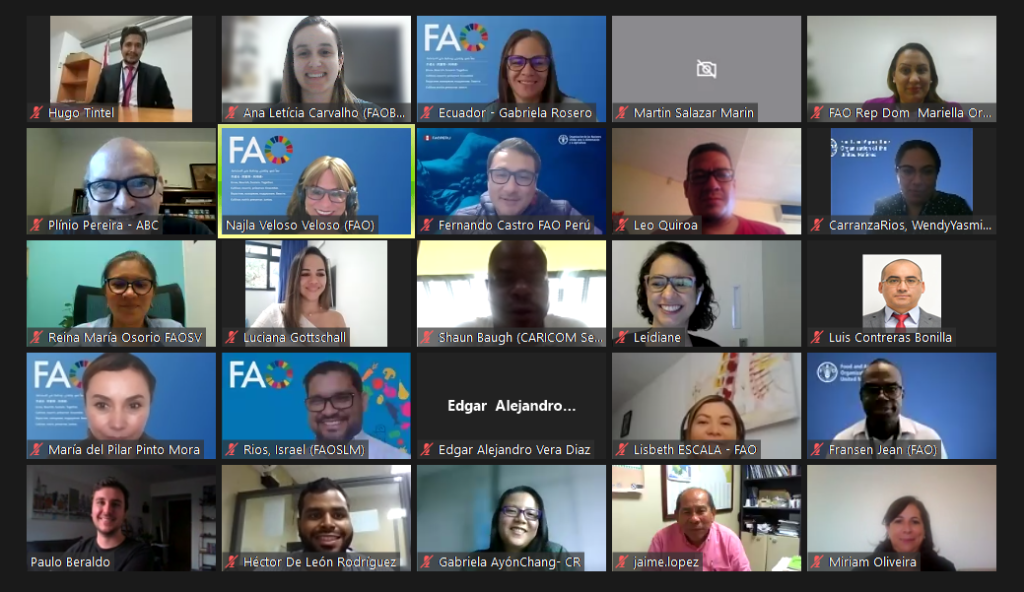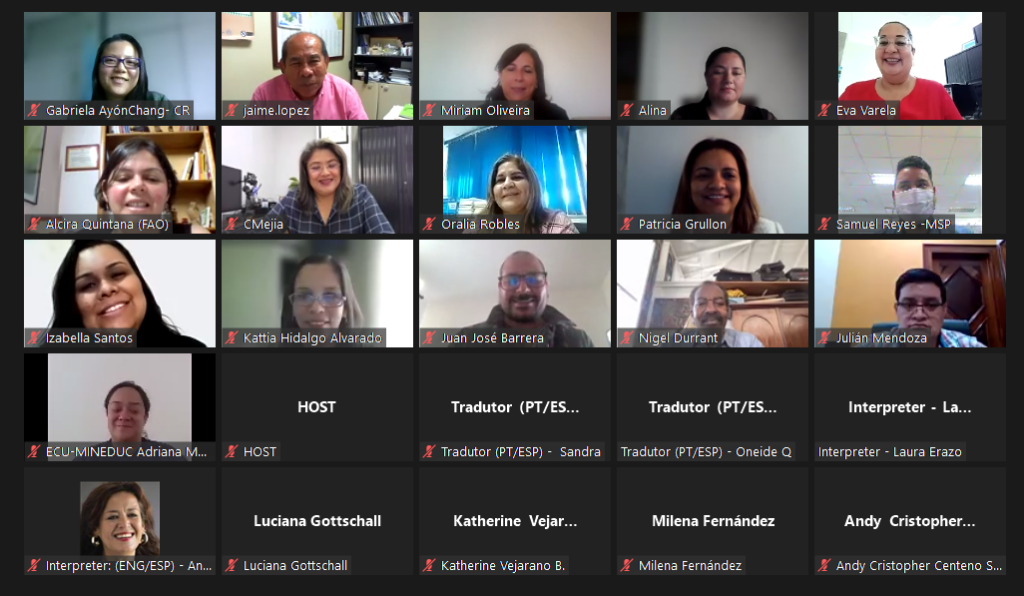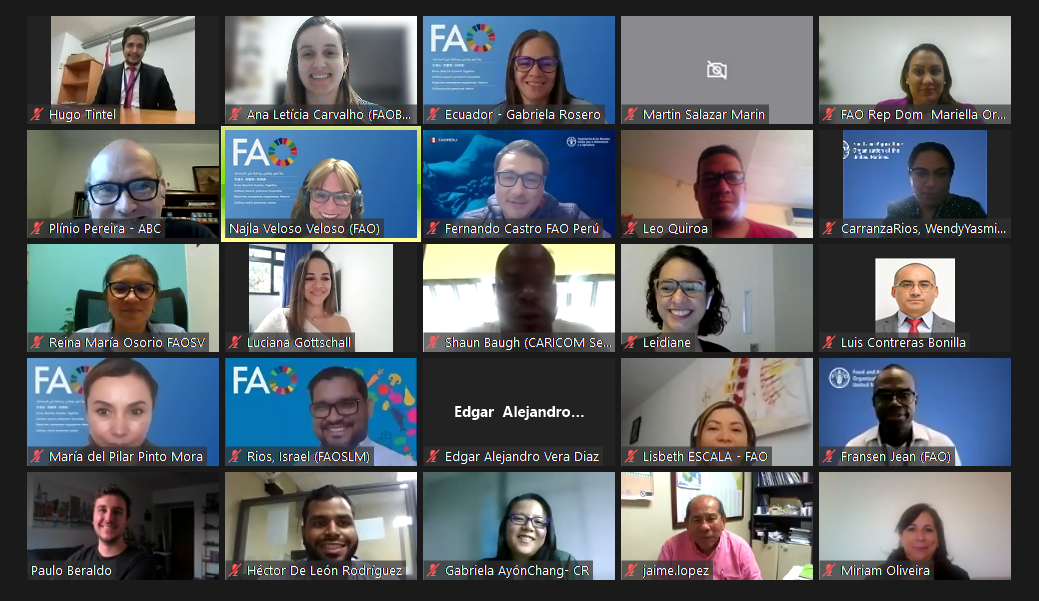Representatives from more than 10 countries of RAES discussed the future of the Network, its objectives and next steps.
Brasília, July 27, 2022 – The school feeding project of the Brazil-FAO International Cooperation Program met for the first time with the technical committee of the Sustainable School Feeding Network (RAES, for its acronym in Spanish), on July 21. The Network’s focal points in more than 10 countries in Latin America and the Caribbean participated virtually, where the operation of the Network, its objectives, its way of supporting the countries and the priorities and expectations of the nations were discussed.
RAES Network is a trilateral south-south cooperation tool developed by the Government of Brazil, through the Brazilian Cooperation Agency (ABC/MRE) and the National Fund Educational Development (FNDE/MEC), with the support of the Food and Agriculture Organization of the United Nations (FAO), through the project Consolidation of School Feeding Programmes in Latin America and the Caribbean. The objective of the Network is, jointly and broadly, to create solutions to the challenges of school feeding.

Plinio Pereira, representing ABC/MRE, pointed out that the Brazilian Government has in the trilateral south-south cooperation an instrument to promote dialogue, exchange and development among countries. “We don’t have the idea that one country knows more about the subject than the other. Everyone can learn from the experiences of others.”
Pereira also detailed the attributions of the technical committee of RAES, which are: to provide technical support to the countries in the implementation, reformulation, strengthening and consolidation of their school feeding programmes; to participate in seminars, training and other activities of the Network; to spread the activities within the countries; to support and participate in exchanges and experiences between countries; to support the dissemination of the virtual platform of the RAES (www.redraes.org); to share the progress of the Network in the countries; and to assist in the preparation of documents when requested.
The Network seeks to support the countries of Latin America and the Caribbean in the implementation and reformulation of their school feeding programmes, under the principle of the human right to adequate food. This right means the provision of healthy, adequate, tasty food and in accordance with the local culture to all students, in adequate spaces, associated with actions of food and nutrition education. To achieve these objectives, RAES promotes technical visits, exchange of experiences and encourages dialogue among countries.
The participating managers of the regional meeting came from Brazil, Chile, Colombia, Costa Rica, Ecuador, El Salvador, Guatemala, Honduras, Panama, Paraguay, Peru, and the Dominican Republic. The Caribbean countries were represented by the multilateral organization Caricom (Caribbean Community).
Representing the FNDE/MEC, Luciana Gottschall stated that RAES will contribute to tackling food and nutritional insecurity in the region, based on the Brazilian experience of school feeding and said that the country has much to contribute. “We are here to do the best we can and we hope to learn a lot from the countries.” Israel Ríos, FAO nutrition officer, said that working together and in a coordinated way is very important to strengthen ties between countries and school feeding managers. “It is an honor to be part of a network that connects countries by sharing experiences and working for the nutrition of millions of children,” he said. Israel also recalled that today in the region there are 56 million people who live in severe food insecurity.

The coordinator of the school feeding project of the Brazil-FAO International Cooperation, Najla Veloso, stressed that it is very important to articulate the countries around school feeding, define joint actions and compose a regional scenario at a technical and political level. “Having an institution organized and directed by the school feeding managers themselves is important to strengthen the dialogue and the political weight of this topic. This is a group that will think of school feeding as a macro policy and will indicate important paths for progress at the regional level,” added Najla.
Country testimonials
Country managers and national focal points commented on the contributions that RAES can bring to their countries. Jean Fransen, food security officer of the FAO Subregional Office in the Caribbean, considers the Network an opportunity to get closer to other countries with experiences that may be useful to the Caribbean region. “In the Caribbean there have been interesting advances and lessons learned that are going to be shared and thus foster a space for exchange,” he said.
From the Dominican Republic, Mariella Ortega added that the challenges of each country can be supported by regional experiences. “This is an extremely wonderful space and I look forward to sharing my experiences, learning from you and listening to colleagues from the region.”
Hugo Tintel, from the Paraguayan school feeding program, commented that the connection among nations promoted by RAES during the pandemic was decisive in developing a strategy to face the health crisis. “This was a very important space for virtual communication that allowed us to rethink the potential of this Network for school feeding policies, to rethink the quality and the coverage of school feeding. RAES is a very important forum.”
Shaun Baugh, representing Caricom, commented on the importance of being part of the Network to learn more about the progress that the region is making in school feeding. “We are looking forward to participating and spreading the Network across the region. We are really happy to be a part of it.”
Creation of RAES
The Sustainable School Feeding Network (RAES) emerged in mid-2018 as a response from the Brazilian government to the United Nations Decade of Action for Nutrition (2016-2025), promulgated by the UN General Assembly in 2016, after the recommendations of the II International Conference on Nutrition, in Rome, in 2014. The Decade records the commitment of world leaders to establish national policies aimed at eradicating hunger and malnutrition, seeking the transformation of food systems in favor of nutritious diets and access to healthy food for all people.



